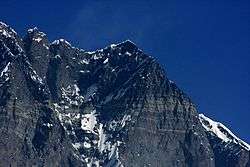Lhotse Shar
| Lhotse Shar | |
|---|---|
|
Lhotse Shar in 2014 | |
| Highest point | |
| Elevation | 8,383 m (27,503 ft) |
| Prominence | 86 m (282 ft) |
| Isolation | 0.62 km (0.39 mi) |
| Parent peak | Lhotse |
| Listing | Eight-thousander |
| Coordinates | Himalayas_scale:100000_ 27°57′30″N 86°56′36″E / 27.95833°N 86.94333°ECoordinates: Himalayas_scale:100000_ 27°57′30″N 86°56′36″E / 27.95833°N 86.94333°E |
| Geography | |
 Lhotse Shar Location in Nepal | |
| Location |
Nepal (Khumbu) China (Tibet Autonomous Region) |
| Parent range | Mahalangur Himal |
| Climbing | |
| First ascent | May 12, 1970 |
Lhotse Shar is a subsidiary mountain of Lhotse, and the 11th-highest mountain on Earth, at 8,383 m (27,503 ft) high. It has the highest fatality rate of all the eight-thousanders – for every 2 people who summit the mountain, one person dies attempting to. [1] However, this is primarily because most climbers tend to try to ascend to the primary peak of Lhotse, rather than the lowest summit of the mountain. It was first climbed by Sepp Mayerl and Rolf Walter on May 12, 1970.
On April 27, 1980, Nicolas Jaeger was seen for the last time at 8,200 metres (26,900 ft) altitude during an attempted ascent of Lhotse Shar in Nepal, and is presumed dead.[2]
References
- ↑ "Lhotse Shar 8400 metres". EverestNews. Retrieved October 7, 2015.
- ↑ Buffet, Charlie (20 March 2005). "Nicolas Jaeger au pays de l'oxygène rare" (in French). Le Monde. Retrieved 29 June 2015.
This article is issued from Wikipedia - version of the 1/10/2016. The text is available under the Creative Commons Attribution/Share Alike but additional terms may apply for the media files.
